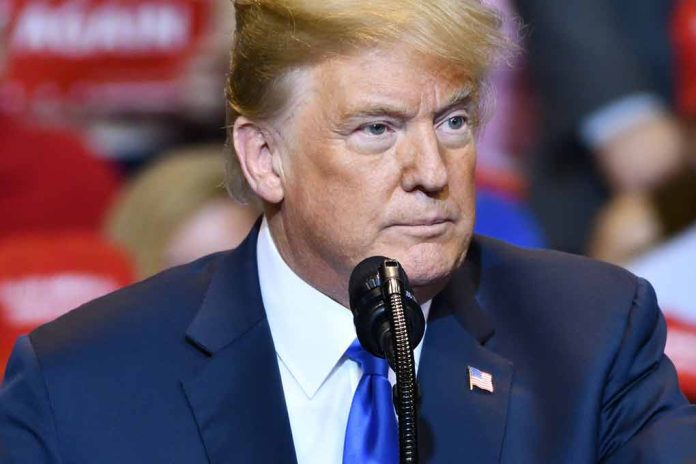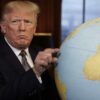🔴 Website 👉 https://u-s-news.com/
Telegram 👉 https://t.me/usnewscom_channel
Taiwan shows remarkable diplomacy as President Lai Ching-te refuses to retaliate against Trump’s 32% tariffs, opting instead to increase US investments and remove trade barriers to strengthen America-Taiwan relations.
Key Takeaways
- Taiwan will not impose retaliatory tariffs against the US despite facing new 32% duties on Taiwanese goods
- Taiwanese companies, led by semiconductor giant TSMC’s $100 billion commitment, plan to increase investments in the United States
- Taiwan’s semiconductors remain exempt from the new US tariffs, preserving a critical trade relationship
- The Taiwanese government is focusing on removing non-tariff trade barriers to facilitate smoother US trade negotiations
- Taiwan implemented stricter short-selling rules to stabilize markets following volatility caused by the US tariff announcement
Taiwan’s Strategic Non-Retaliation Approach
In a display of diplomatic pragmatism, Taiwan has chosen cooperation over confrontation in response to President Trump’s recent 32% tariff imposition on Taiwanese goods. President Lai Ching-te announced that Taiwan would not pursue retaliatory tariffs against the United States, marking a significant departure from how other nations typically respond to trade restrictions. This approach demonstrates Taiwan’s understanding of its strategic position in relation to its most important international ally and the complex geopolitical environment in which it operates.
Rather than escalating tensions, Taiwan’s leadership has signaled their intention to remove existing trade barriers and foster deeper economic cooperation. This strategic response reflects Taiwan’s commitment to maintaining positive relations with the United States even when faced with challenging trade policies. The decision also highlights Taiwan’s pragmatic recognition that antagonizing America would serve neither its economic nor security interests, particularly given the ongoing threats from mainland China.
🚨🇹🇼TAIWAN OFFERS ZERO TARIFFS & MORE INVESTMENT TO ALIGN WITH TRUMP’S TRADE RESET
As Trump unleashes a bold tariff overhaul, Taiwan isn’t retaliating—it’s adapting. President Lai Ching-te just proposed zero tariffs with the U.S. and pledged deeper investment in America.
Rather… https://t.co/WrhnbUyZOE pic.twitter.com/Z4FMEDb5NN
— Mario Nawfal (@MarioNawfal) April 6, 2025
Increasing US Investments as a Trade Strategy
Taiwan’s commitment to increasing its investments in the United States forms the cornerstone of its response to the new tariffs. Leading this investment drive is Taiwan Semiconductor Manufacturing Company (TSMC), which has announced plans for a monumental $100 billion investment in American operations. This strategic move demonstrates Taiwan’s commitment to being part of the solution to America’s concerns about trade imbalances, while simultaneously securing its position in the global semiconductor supply chain.
“In the future, in addition to TSMC’s increased investment, other industries, such as electronics, information and communications, petrochemicals, and natural gas will be able to increase investment in the U.S. and deepen Taiwan-U.S. industrial cooperation,” said Taiwanese President Lai Ching-te.
Beyond semiconductors, Taiwan is encouraging investments from its electronics, information technology, petrochemical, and natural gas industries. This diversified investment approach serves multiple purposes: it creates American jobs, transfers valuable technological expertise to US soil, and cements Taiwan’s position as an indispensable economic partner. The strategy also effectively responds to President Trump’s core concern about bringing manufacturing back to America, aligning Taiwan’s actions with US economic priorities.
Addressing Non-Tariff Trade Barriers
Taiwan’s response includes a significant focus on removing non-tariff trade barriers that have historically complicated US-Taiwan trade relations. President Lai Ching-te specifically highlighted this approach as a means to demonstrate Taiwan’s commitment to fair trade practices. By proactively addressing these less visible but equally important barriers, Taiwan aims to create smoother pathways for bilateral trade negotiations and demonstrate good faith in resolving longstanding issues.
“Non-tariff trade barriers are an indicator for the U.S. to assess the fairness of trade, and Taiwan will proactively resolve non-tariff trade barriers that have existed for many years to make trade negotiations with the U.S. smoother,” stated Taiwanese President Lai Ching-te.
Taiwan’s Financial Supervisory Commission has already taken steps to stabilize financial markets in response to volatility caused by the US tariff announcement. New short-selling rules have been implemented, including caps on intraday securities lending orders and increased minimum margin requirements. These measures reflect Taiwan’s commitment to maintaining economic stability while navigating the challenges presented by the new tariff landscape. The exemption of Taiwan’s critical semiconductor exports from the new US tariffs has provided some breathing room for the island nation’s economy.
Strengthening the US-Taiwan Partnership
Taiwan’s measured response to potentially damaging tariffs demonstrates its commitment to the broader US-Taiwan relationship, which extends far beyond mere economic considerations. By choosing cooperation over confrontation, Taiwan reinforces its position as a reliable partner to America in the strategically vital Indo-Pacific region. The island nation clearly recognizes that its security partnership with the United States transcends temporary economic disagreements, and that maintaining strong ties serves the national interests of both countries in countering regional threats.
“In the face of the U.S. ‘reciprocal tariffs’, Taiwan has no plans to take tariff retaliation, and there will be no change in the investment commitments of enterprises to the United States as long as they are in the national interest,” said Taiwanese President Lai Ching-te.
Taiwan’s approach serves as a reminder that effective international partnerships require compromise and strategic thinking. Rather than engaging in tit-for-tat tariff battles, Taiwan has chosen a path that preserves its economic interests while supporting American economic priorities. This sophisticated response showcases Taiwan’s diplomatic maturity and strategic vision in navigating complex international trade challenges while maintaining its essential alliance with the United States.

